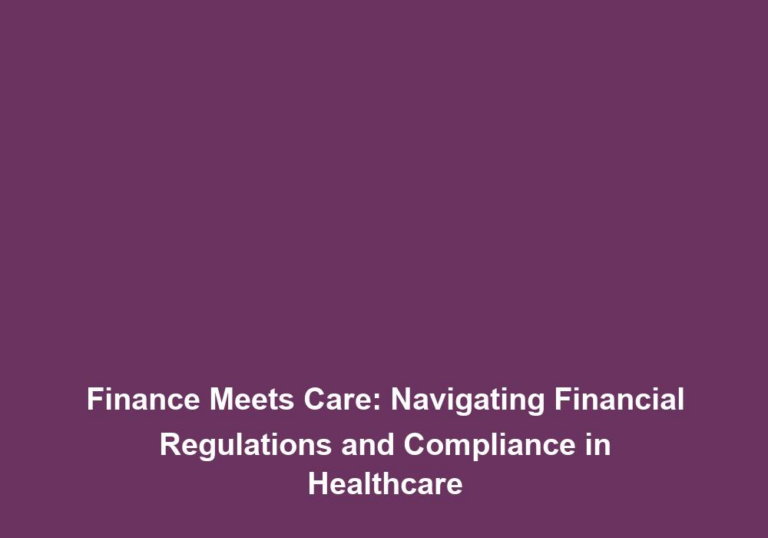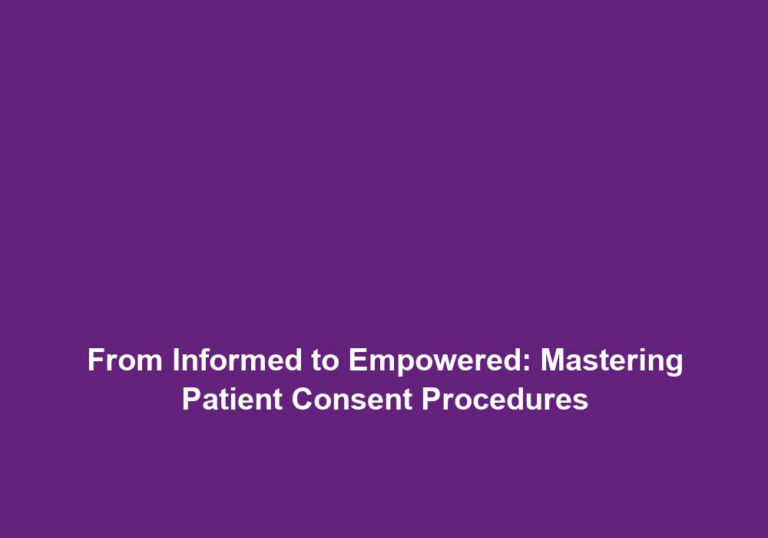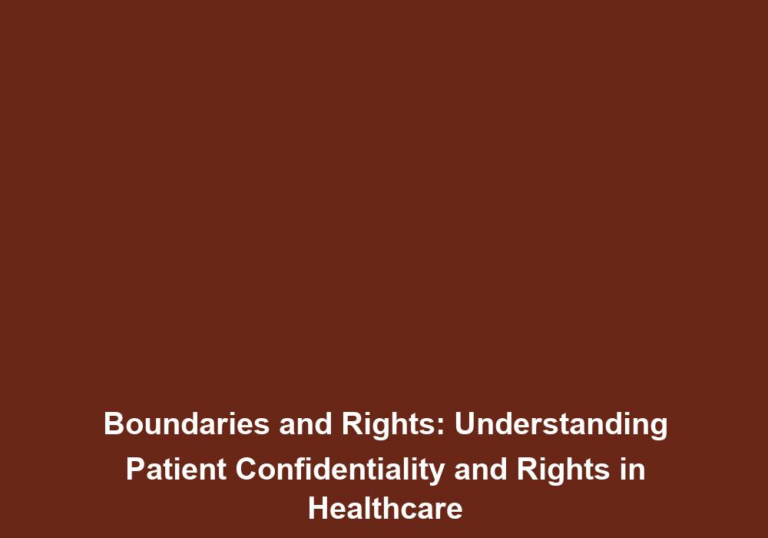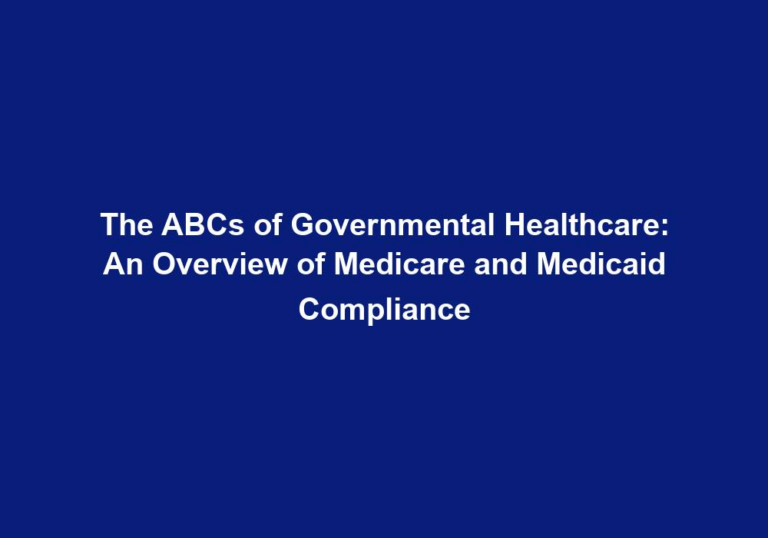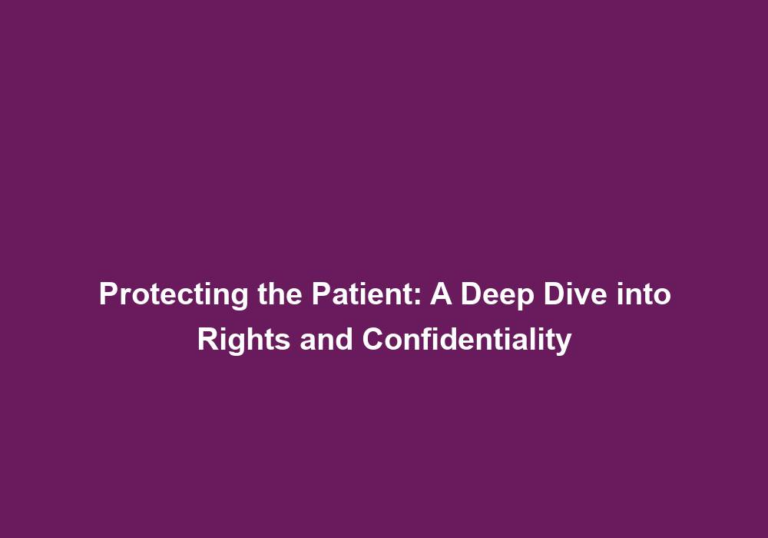The Dollars and Cents of Care: Ensuring Financial Compliance in Healthcare
In the ever-evolving landscape of healthcare, ensuring financial compliance is of utmost importance. From insurance reimbursement to billing and coding practices, healthcare organizations must navigate numerous regulations and guidelines to maintain a financially stable operation. This article will explore the key aspects of financial compliance in healthcare and provide insights into how organizations can effectively manage their finances while adhering to industry rules.
Understanding Financial Compliance in Healthcare
Financial compliance in healthcare refers to the adherence of healthcare organizations to laws, regulations, and industry standards concerning financial operations. This includes both internal policies and external regulations imposed by government bodies and insurance providers. Failure to comply with these requirements can result in severe penalties, legal consequences, and reputational damage.
Financial compliance encompasses various aspects, including accurate billing and coding practices, proper documentation and record-keeping, internal audit and monitoring programs, contract and payer compliance, and adherence to regulatory requirements. By understanding and complying with these components, healthcare organizations can mitigate legal risks, enhance reimbursement processes, improve revenue cycle management, and preserve their reputation.
The Impact of Financial Compliance on Healthcare Organizations
- Mitigation of Legal Risks: Financial compliance helps healthcare organizations mitigate legal risks associated with fraud, abuse, and improper financial practices. By implementing sound financial policies and procedures, organizations can ensure that they operate within legal boundaries and avoid potential penalties or lawsuits.
Proper financial compliance safeguards healthcare organizations against legal repercussions and helps maintain the integrity of their operations. By adhering to laws and regulations, organizations can avoid fines, legal battles, and damage to their reputation.
- Enhanced Reimbursement Processes: Compliance with reimbursement guidelines is crucial for healthcare organizations to receive timely and accurate payments for the services they provide. Proper documentation, coding practices, and adherence to reimbursement policies can improve the chances of maximizing reimbursement and reducing claim denials.
Accurate billing and coding practices are essential for healthcare organizations to receive appropriate reimbursement for the services they provide. By adhering to coding standards such as Current Procedural Terminology (CPT) codes, Healthcare Common Procedure Coding System (HCPCS), and International Classification of Diseases (ICD) codes, organizations can ensure accurate claims submission and reduce the risk of payment delays or denials.
- Improved Revenue Cycle Management: Adhering to financial compliance requirements translates into a well-managed revenue cycle for healthcare organizations. Effective revenue cycle management involves streamlining billing processes, optimizing reimbursement, and reducing the occurrence of billing errors or discrepancies.
Proper financial compliance practices contribute to a streamlined revenue cycle management process. By implementing efficient billing processes, accurately documenting patient encounters, and ensuring adherence to industry guidelines, healthcare organizations can optimize reimbursement and minimize revenue leakage.
- Preservation of Reputation: Compliance with financial regulations demonstrates an organization’s commitment to ethical and responsible practices. Maintaining a strong reputation is vital for healthcare organizations, as it directly influences patient trust, partnerships with insurers, and overall business sustainability.
Maintaining a reputation of financial compliance is essential for healthcare organizations to build trust and credibility among patients, insurers, and other stakeholders. By adhering to regulations and showcasing ethical financial practices, organizations can foster a positive reputation and secure valuable partnerships.
Key Components of Financial Compliance in Healthcare
To ensure financial compliance, healthcare organizations must focus on various key components:
1. Billing and Coding Compliance
Proper billing and coding practices are essential for accurate reimbursement and financial compliance. Healthcare organizations should establish processes that adhere to coding standards, such as the Current Procedural Terminology (CPT) codes, Healthcare Common Procedure Coding System (HCPCS), and International Classification of Diseases (ICD) codes. Regular audits and training programs can help identify and rectify any coding errors or irregularities.
Accurate billing and coding practices are the foundation of financial compliance in healthcare. Healthcare organizations should implement robust processes that align with industry coding standards. Regular audits and training programs can help identify and rectify any coding errors or irregularities, ensuring accurate reimbursement and compliance with industry guidelines.
2. Documentation and Record-Keeping
Accurate and complete documentation is vital for financial compliance. Healthcare organizations must maintain detailed records of patient encounters, treatments, diagnoses, and procedures. This documentation supports reimbursement claims and helps ensure that services are appropriately billed. Adhering to proper documentation practices also facilitates audits and investigations.
Proper documentation and record-keeping are essential for financial compliance in healthcare. Healthcare organizations should establish comprehensive processes for documenting patient encounters, treatments, diagnoses, and procedures. Accurate and complete documentation not only supports reimbursement claims but also enables effective audits and investigations, ensuring compliance with industry regulations.
3. Internal Audit and Monitoring Programs
Establishing internal audit and monitoring programs is crucial for healthcare organizations to proactively identify and address areas of non-compliance. Regular audits can help detect billing errors, identify potential fraud or abuse, and ensure that financial operations align with industry guidelines. Monitoring programs allow organizations to track key performance indicators and identify any deviations or anomalies.
Internal audit and monitoring programs play a vital role in maintaining financial compliance in healthcare. By conducting regular audits, healthcare organizations can identify potential compliance issues, rectify them promptly, and ensure alignment with industry guidelines. Implementing monitoring programs enables organizations to track key performance indicators, detect anomalies, and take corrective actions.
4. Contract and Payer Compliance
Healthcare organizations must comply with the terms and conditions specified in their contracts with payers, such as insurance companies or government healthcare programs. This includes accurate billing, timely filing of claims, and adherence to contractual pricing and reimbursement policies. Failure to comply may result in denied claims or reduced reimbursement rates.
Complying with contract and payer requirements is essential for financial compliance in healthcare. Healthcare organizations should carefully review and adhere to the terms and conditions specified in their contracts with payers. This includes accurate billing, timely claims submission, and adherence to pricing and reimbursement policies. Failure to comply with contract requirements may result in denied claims or reduced reimbursement rates.
5. Regulatory Compliance
Healthcare organizations must stay abreast of the ever-changing landscape of healthcare regulations. Compliance with laws such as the Health Insurance Portability and Accountability Act (HIPAA), the Affordable Care Act (ACA), and the False Claims Act is crucial. Regular training sessions and ongoing education ensure that staff members are well-informed about their responsibilities and obligations.
Compliance with regulatory requirements is essential for financial compliance in healthcare. Healthcare organizations should stay updated on laws and regulations, such as HIPAA, ACA, and the False Claims Act. Regular training sessions and ongoing education programs ensure that staff members are well-informed about their responsibilities, obligations, and the latest regulatory updates.
Best Practices for Ensuring Financial Compliance
- Establish Clear Financial Policies and Procedures: Healthcare organizations should develop and communicate comprehensive financial policies and procedures. These documents should outline the organization’s commitment to compliance and provide guidance on specific financial practices, including billing, coding, documentation, and reimbursement.
Establishing clear financial policies and procedures is crucial for ensuring financial compliance in healthcare. Healthcare organizations should develop comprehensive documents that clearly outline their commitment to compliance and provide detailed guidance on financial practices. These policies and procedures act as a roadmap for staff members, ensuring consistency and adherence to industry regulations.
- Engage in Regular Training and Education: Continuous training and education programs are essential to keep staff members up-to-date on industry regulations and best practices. This includes comprehensive training on proper billing and coding techniques, documentation requirements, and the importance of compliance.
Regular training and education are key to maintaining financial compliance in healthcare. Healthcare organizations should invest in continuous training programs to keep staff members informed about industry regulations, best practices, and the importance of compliance. Comprehensive training on billing and coding techniques, documentation requirements, and compliance obligations ensures that staff members are equipped with the necessary knowledge and skills.
- Implement Effective Internal Controls: Strong internal controls safeguard against financial non-compliance. Healthcare organizations should establish protocols for reviewing and approving financial transactions, conducting regular audits, and monitoring billing and reimbursement processes.
Implementing effective internal controls is essential for financial compliance in healthcare. Healthcare organizations should establish clear protocols for reviewing and approving financial transactions, conducting regular audits, and monitoring billing and reimbursement processes. Strong internal controls help prevent non-compliance and ensure that financial operations align with industry regulations.
- Conduct Regular Audits and Monitoring: Regular audits, both internal and external, help identify potential compliance issues and provide an opportunity to rectify them promptly. Organizations should implement auditing procedures to assess the accuracy of financial records, coding practices, and adherence to regulations.
Regular audits and monitoring play a critical role in maintaining financial compliance in healthcare. Healthcare organizations should conduct both internal and external audits to assess the accuracy of financial records, coding practices, and adherence to regulations. By identifying potential compliance issues through regular audits, organizations can take prompt corrective actions and ensure ongoing compliance.
- Maintain a Culture of Compliance: Fostering a culture of compliance within the healthcare organization is crucial. This includes leadership commitment, staff accountability, and a proactive approach to addressing non-compliance issues. Regular communication about compliance expectations and recognition of compliant behavior contribute to a compliance-focused environment.
Maintaining a culture of compliance is essential for financial compliance in healthcare. Healthcare organizations should foster an environment where compliance is prioritized. This involves leadership commitment to compliance, establishing staff accountability, and proactively addressing non-compliance issues. Regular communication about compliance expectations and recognition of compliant behavior contribute to a culture that values and promotes compliance.
Conclusion
Ensuring financial compliance in healthcare is a multifaceted endeavor that requires attention to detail, adherence to industry regulations, and a commitment to ethical financial practices. By prioritizing financial compliance, healthcare organizations can mitigate legal risks, enhance reimbursement processes, improve revenue cycle management, and preserve their reputation. Implementing best practices and establishing robust internal controls will help organizations navigate the complex landscape of financial compliance and ensure the long-term financial sustainability of their operations.


